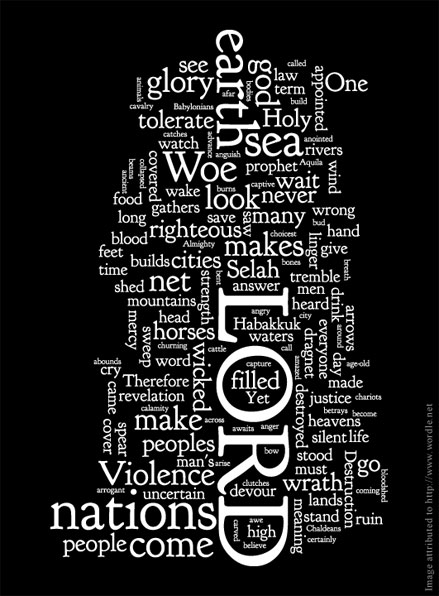The Wrath of Love
(From The Magnificence of Mercy by Geoffrey Bingham)
‘In wrath remember mercy…’
It would seem that Habakkuk had to remind God that in his wrath He should remember mercy towards errant Israel. The covenant revelation of God in Exodus 34:6 was that He was (is) ‘slow to anger’ (Num. 14:18; Neh. 9:17; Ps. 86:15), especially in regard to Israel. The prophet did not have to remind God, so much as he had to remind himself of the love of God, and to see God’s judgment as the wrath of love. If we ask what causes God’s actions of mercy, grace, slowness to anger (long-suffering), steadfast love, faithfulness, forgiveness and even refusal to clear the (impenitent, obdurate) guilty—as set out in Exodus 34:6-7—then we must answer that it is His love.
Here we are indebted to St Paul. His passage of Ephesians 2:1-10, and in particular verse 4, tells us that Man, being under wrath, receives mercy, and that God’s mercy springs from His love, ‘But God who is rich in mercy, out of the great love with which he loved us…’ Paul was not saying anything new when he insisted that mercy springs from love to those under wrath and misery. This thinking was clearly present in the Old Testament. In Isaiah 54:8 we saw God’s statement, ‘In overflowing wrath for a moment I hid my face from you, but with everlasting love I will have compassion on you, says the Lord, your Redeemer’. Doubtless the ‘moment’ seemed of inordinate length to Israel under wrath, but God’s ‘everlasting love’ reduces it to a mere moment. Likewise the smiting and healing of Egypt is the principle by which His love has wrath, ‘And the Lord will smite Egypt, smiting and healing, and they will return to the Lord, and he will heed their supplications and heal them’.
Markus Barth, in his commentary on Ephesians, remarks:
In the Bible the ‘wrath’ of God, in turn, does not represent the intemperate outburst of an uncontrolled character. It is rather the temperature of God’s love, the manifestation of his will and power to resist, to overcome, to burn away all that contradicts his counsels of love.
‘The temperature of God’s love’ is a powerful phrase. In the Old Testament, this temperature is sometimes shown as white-hot when God’s holiness is violated, but when wrath has done its work the stage is set for Divine mercy.
__________________________________
Read more [PDF].



























May 31st, 2010 at 9:40 am
“The prophet did not have to remind God, so much as he had to remind himself of the love of God, and to see God’s judgment as the wrath of love.”
What about the dangerous yet successful Mosaic paradigm in Exodus 32:7-14? In this section, the prophet is able to approach, contest and sway God’s wrath (vv. 11-13). In response to Moses’ challenge, the text tells us, “and the Lord changed his mind about the disaster that he planned to bring on his people” (v. 14)…
… And what was the cornerstone of his defense? — the appeal to memory (v. 13). Moses cites the exodus event, and he further appeals to the covenant established with Abraham.
Exegetically said, human agents when in-line with the memory of Scripture are empowered to approach and challenge the memory of God himself. — Indeed, there may have been another deluge if it weren’t for Moses’ agency, and God may have lamented as he did so poignantly in Genesis 6:6.
It might sound crazy that God needs, or relies, on humans in order to bring about his purposes for the cosmic renewal or eschaton, but a close exegesis of Exodus 32 supports it; furthermore, the overall canonical sweep of Scripture supports such a daring mutual interdependency of God/heaven and humans/earth, founded by Gen. 1:26-28, and supported in Gen. 5:1, Gen 9:6.
Therefore, I am not quite on-board with your above claim, as the relationship between humankind and God, as depicted in the biblical account, is more complex and nuanced.
May 31st, 2010 at 9:54 am
Caveat: or perhaps God was fishing for an answer, testing his prophetic subject in order to see how he would respond to such utter destruction of his covenant people. But if Moses had not chosen to speak up, then would the fire and brimstone have been unleashed? I think so.
An inner-exegetical parallel to Exodus 32: If Samuel would have interceded on Saul’s behalf – a king that was well within the monarchic stipulations in Deut. 17, unlike David and Solomon (the latter breaking every single stipulation, other than his being, ironically, “not a foreigner”) – then perhaps God would have changed his mind about erasing the Saulide line, as he changed his mind here in Ex. 32 (see 1 Sam. 15).
Ergo, perhaps your claim is an accurate one. Please excuse my thinking out-loud – HA!